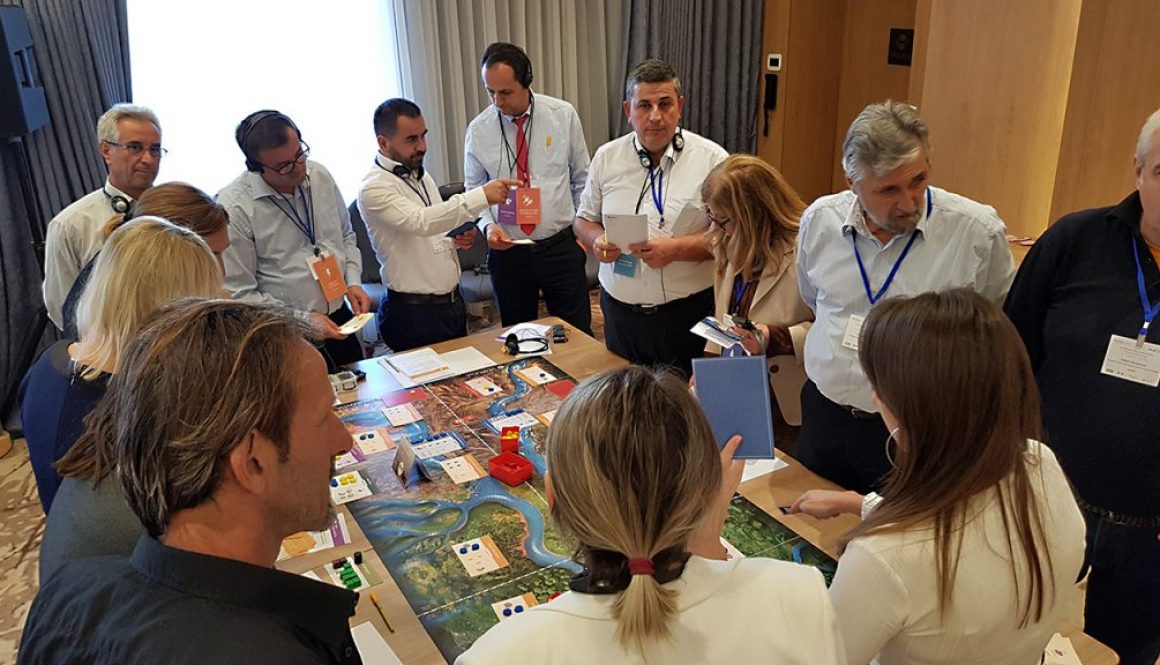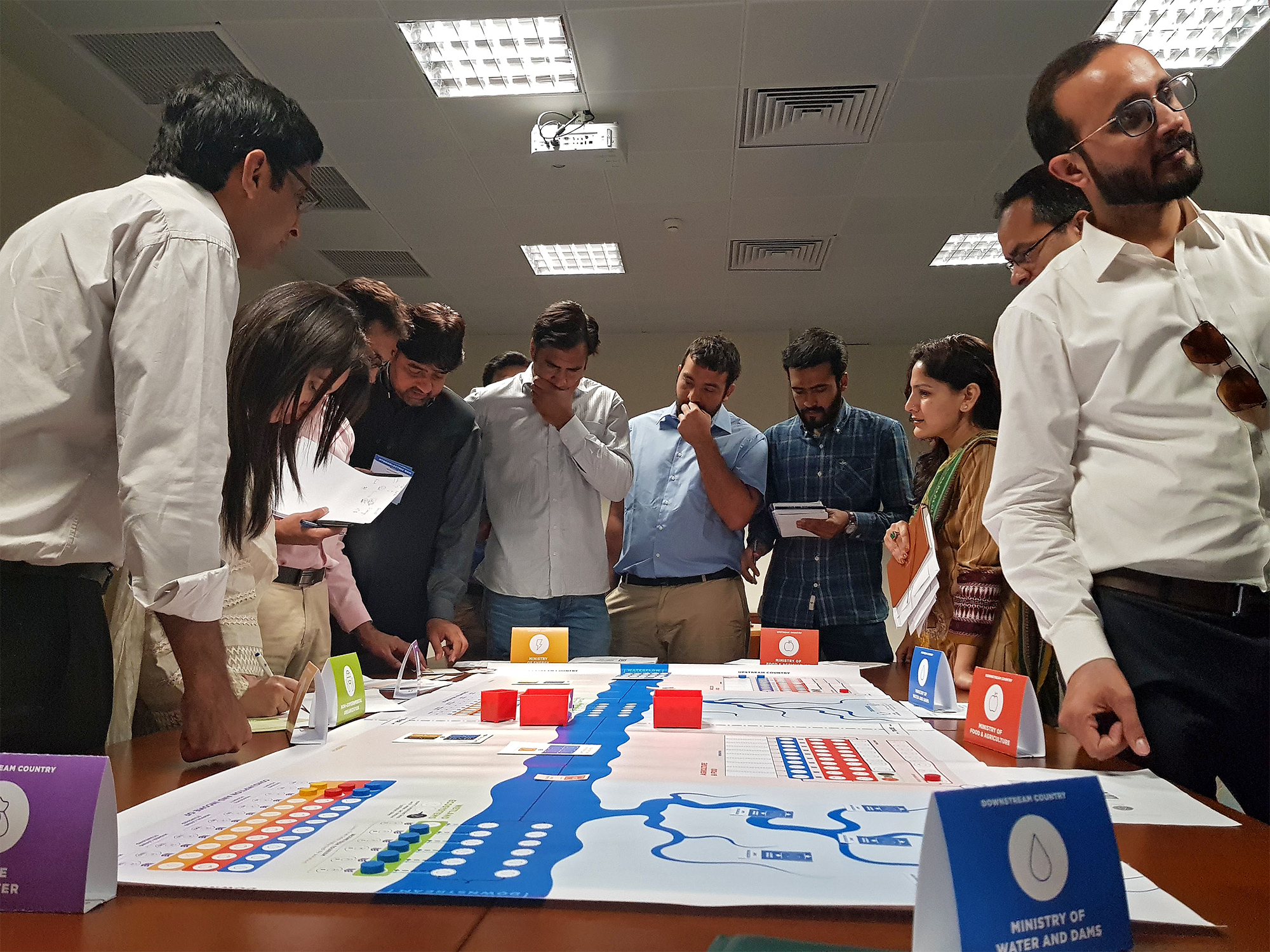
Aleksandra Solińska-Nowak
20 min read
17.07.2018
Understanding The Nexus Approach
The nexus approach
The Latin term „nexus” refers to the act of binding something together. The concept was first mentioned in the context of resource management in 1980s, especially in connection with the UN University Food-Energy Nexus programme. It was not until the Bonn2011 Nexus Conference, however, that the nexus approach gained relevant prominence. Guided by the principle of integrating management and governance across sectors and scales, the conference argued that the nexus approach can improve water, energy and food security, at the same time supporting the transition to a green economy, which is expected to increase resource efficiency and provide greater policy coherence.
The need for a more integrated, holistic approach both to the resource management and to the global policy in general became even more undisputable with the adaptation of the Sustainable Development Goals (SDGs) in 2015. To simultaneously address the 17 major priorities, ranging from poverty and hunger alleviation, gender equality, industry development to sustainable production and environment protection, we are all required to recognize the interrelatedness and interdependence of these, partially overlapping or competing, goals, and to grasp the complex net of interactions, trade-offs and synergies that they create. Advancing towards a more stable and sustainable future depends thus on the “nexus thinking” or “systems thinking” that, instead of just looking at individual components and short-term quantitative outcomes, recognizes feedbacks and connections, and promotes concerted action and cooperation on a global scale across sectors, time and space.
From time to time a woman in black approaches each department, passing them a thick pile of documents. Upon her arrival, the group discussions become even more stormy. It means that a new problem or request has been submitted by the society. Departments’ heads are scanning the documents quickly, trying to prioritize issues the group has to address. The time is running, members of the groups seem to be far from reaching a consensus, and a stream of new issues is still flowing. Suddenly, a collective sigh of relief may be heard – the water department voted for a policy unanimously. The head of the department leaves to pass their proposal to the council. Just in time! Almost simultaneously, a moderator rings a bell and asks the buzzing crowd for attention.
Why do we need the nexus approach
A range of socio-ecological processes, such as population growth, economic development and urbanization have contributed to an overall change in the way land and natural resources are exploited, processed and consumed. Growing demand and unsustainable management have increased man’s ecological footprint and caused modification or degradation of the natural resource base in many areas of the world. The situation is further exacerbated by pollution and human-driven climate change, which results in uncertainty and less reliable food and water supplies due to e.g. intense extreme events (such as droughts or floods). Such pressures may in long-term drive social-ecological systems across critical thresholds, leading to irreversible water, energy and food crises. To avoid this situation and align with the Sustainable Development Goals, we need a shift towards improved resource efficiency, demand management and more sustainable consumption patterns.
The nexus approach can guide a transition to sustainability, by reducing negative impacts within the system and producing gains that outweigh the costs connected with investing in better policy and “greener” technology. Based on a better understanding of the interdependence of water, energy and food, this integrated approach identifies multilateral beneficial solutions to resource management (e.g. water and waste recycling, investing in green infrastructure or renewable sources of energy) and provide way to meet the needs of the present without compromising the ability of future generations to meet their own needs.
Nexus Game
Messy business
While the benefits of a nexus approach for individuals and societies are unquestionable, little is known how to advance this approach, especially in a multi-stakeholder environments. Global challenges that involve many diversified groups of stakeholders taking decisions under uncertainty, require collaboration on many different levels. The complex nature of socio-ecological system is characterized by messiness, with many processes happening at the same time. Without a proper understanding of the variables, policymakers may solve one problem but unintentionally generate another one, as illustrated, e.g. by the misconceptions connected with the renewable sources of energy. Many people may think that because the renewables cannot generally be over-exploited or depleted, they do not involve any negative impacts. Meanwhile, overdependence on them may highly interfere with other nexus sectors. For example biofuels, and to some extent hydropower, demand more water per unit of energy produced compared to fossil fuels. They also involve a risk of negative energy gains. For instance, corn grown in the US for energy purposes may require more calories of input than it eventually produces. As a consequence, unless integrated in multi-use systems, biofuels may actually compete with food production for water, potentially decreasing the resilience of food production systems.
Many attempts to identify an optimal path towards sustainability fail due to over-reliance on hard data and inadequate appreciation of the diversity of ways decisions are made. People often erroneously assume that their choices stem from rationality. Meanwhile, we are never equipped with perfect information on the situation and are prone to show bias, rely on misconceptions and our individual understanding of the issue, and favor short-term gains rather than longstanding solutions. Add to it differences in human values or interest and uncertainty that underlies our future, and the complexity of collaborative decision-making becomes evident. There is myriad of perspectives the sustainability transformation may be approached and no one “optimal” answer to it exists. This raises the question: How to advance a socially accepted solution? The solution that is agreed upon by the majority of stakeholders and offers possibilities to address all the nexus sectors and their complex interactions?
The Nexus Game offers a possibility to explore the dynamics of transboundary resource management. The game setting contains two countries sharing a river basin and thus facing interlinked challenges of water, energy and food production and consumption. By assuming the roles of the prime ministers, water ministers, energy ministers or agriculture ministers, the players enter into inter-government and international negotiations in order to meet the growing people’s demands and at the same time achieve sustainable development in both countries.
Social simulation to explore the nexus approach
There are many ways the complexity of water-energy-food nexus may be explored, however the best option is always to actively engage the stakeholders. Activities that enable people to collaboratively explore alternative scenarios offer space for creativity required to discover brand new paths, and enable the participants to understand competing interests and worldviews, which is a starting point for negotiating a consensus. In this context social simulations are gaining recognition, as a tool for triggering involvement and increasing public awareness on many serious issues. Simulating the reality of socio-ecological dilemmas, they help “players” immerse in their roles and gradually discover the complex landscape of problems, responsibilities and opportunities.
The Nexus Game is a good example, as it offers a possibility to explore the dynamics of transboundary resource management. The game setting contains two countries sharing a river basin and thus facing interlinked challenges of water, energy and food production and consumption. By assuming the roles of the prime ministers, water ministers, energy ministers or agriculture ministers, the players enter into inter-government and international negotiations in order to meet the growing people’s demands and at the same time achieve sustainable development in both countries. Their task is not easy, taking into consideration the interlinked pressures, such as the unpredictable rainfall (resulting in floods or droughts) and the shrinking natural and monetary resources. The decisions they make receive almost immediate feedback, as e.g. erroneous distribution of water tokens negatively affects power generation or agriculture production. Consequently, throughout the game, the participants may discover a number of dependencies existing across and within water, energy and food systems and learn that sustainable resource management requires forward looking and making difficult choices between meeting current needs and investing in developments technologies that may positively affect their countries’ production and consumption trends.
As noticed by Mochizuki et al. (2018), one of the significant characteristics of the game is that the players observe not only the benefits but also trade-offs connected with reducing resource use and transition to low-emission options. For example, an improved coal power plant burns coal at a higher temperature, reducing coal input and GHG emissions but increasing water footprint. A micro-hydroelectric plant, on the other hand, although cleaner, depends highly on water availability and may be ineffective in times of drought. By highlighting these inevitable “costs” that have to be born, the players are able not only to gain a more holistic perception of the system, but also understand the dilemmas of policy-making under uncertainty.
The Nexus Game, like most “serious” games, does not rely on rivalry or single goal completion but presents the array of challenges and opposing interests that the players have to face to determine their own priorities. While exploring the simulated world, the participants soon become aware of the need to communicate and collaborate.The two countries are highly dependant on the river their share, therefore individual and common interests blurry, creating a space for negotiations and compromises. All ministers are given partial authority and may focus solely on their sectors. However, if they don’t decide to cooperate within and and across the boundaries of their country, serious problems emerge in all nexus sectors. “I have learned that energy, agriculture, water ministers must collaborate with each other to better decision making. They are interdependent systems,” as one of the players summarized the experience.
The simulation, developed in collaboration with the International Institute for Applied Systems Analysis (IIASA) in cooperation with the Sustainable Energy for All initiative, has been played, i.a., with the participants of the Dresden Nexus Conference, the employees of the African Development Bank in Abidjan (Ivory Coast) and water and energy professionals in Johannesburg (South Africa) and Cairo (Egypt). Many valuable insights and reflections emerged during these sessions, as most of the players agreed that the Nexus Game offers a playful, participatory and hands-on experience, which allowed them to learn from each other, view their opinions and gain a better understanding of the nexus approach to resource management. One of the participants of the Egyptian session admitted, for example, that the immersion in the simulated world helped him “see the big picture and evaluate situations objectively not subjectively, from a different perspective that usual”. Greater empathy, perspective-taking as well as the ability to perceive global challenges not as individual obstacles but as part of the bigger system, are among most appreciated lessons drawn by the Nexus players. Another Egyptian participant stated, for example, that via exploring the game’s world, he “learned how water is the propeller of development in every field, like food production, energy, and how it affects the pollution.” All these comments confirm our belief that social simulations are powerful tools to be explored while developing long-term strategies and policies, and may definitely support sustainable practices that will ultimately lead to a more fair, stable, inclusive and satisfied societies living in harmony with Nature.
References
Hoff, Holger. 2011. Understanding the NEXUS. Background Paper for the Bonn2011 Conference: The Water, Energy and Food Security Nexus. Stockholm: Stockholm Environment Institute.;
Mochizuki J., Magnuszewski P., Linnerooth-Bayer J. (2018) Games for Aiding Stakeholder Deliberation on Nexus Policy Issues. In: Hülsmann S., Ardakanian R. (eds) Managing Water, Soil and Waste Resources to Achieve Sustainable Development Goals. Springer, Cham


